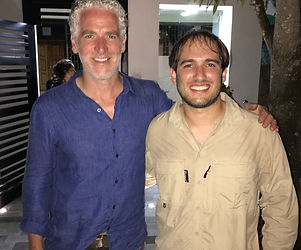
Diego Ellis Soto
Movement ecologist
In this site you can find information about my current research and outreach, adventures in the field, some snippets of code and cute pictures. Come join my adventures!
About me
I am Uruguayan movement ecologists with a slight obsession with Galapagos tortoises. Currently I am a first year PhD student at Yale University. My interests span from analyzing animal movement, using animals to collect environmental information, biodiversity research, conservation and outreach. I enjoy collaborative research across disciplines with real world implications. My fieldwork is largely based in the Galapagos Archipelago with diverse sources of funding. The rest of my research is mostly based on data crunching – analyzing data collected by field biologists all over the world.
Come join me!
My Research
Research involves constant investigating and redesigning of the scientific questions posed. The strength of my research lies in the breadth and depth of the experimental and statistical approaches I utilize in understanding the mechanisms that drive the systems I am studying. Learn more about my ongoing research projects below.

Using animals as sentinels of the environment:
With increasing technological developments, we are currently in a ‘golden age’ of exploring animal migrations and fine scale movement dynamics. Sensors collected on animals do much more than record the coordiantes of animals in space and time. We can literally use animals as swimming, flying and walking (am I missing a movement mode?) weatherstations which can improve out weather forecast, understand the needs of animals throughout their lifespans and even improve our own lives. Understanding and using animals “sixed senses” is one of my major research interest and hobby at the same time.
I am currently exploring external temperature collected by Himalaya vulture and Galapagos tortoises and comparing this with satellite temperature measurements. While vultures can act as flying thermometers across half of Asia, tortoises are weather stations that walk up and down the Galapagos for over 200 years!

Movement ecology and conservation biology of Galapagos tortoises using new technologies
The Galapagos islands hold a special place in my heart. I have been visiting this archipelago since I was nineteen and spent around a year living in Santa Cruz Island this far. The Galapagos tortoise movement ecology program (http://gianttortoise.org) is a international group of collaborators that works closely with policy makers and the Galapagos National park to conserve Galapagos tortoises (old and young, look at my pictures for cute baby tortoises!). We aim to understand why, when, how and where tortoises migrate and what consequences this has for their reproduction, for the ecosystem and how we can mitigate human-tortoise conflicts. We are increasingly using remote sensing, machine learning, drones and new GPS tags to understand the life of some of the most iconic creatures in the planet.

Biodiversity and global change analysis
Through analyzing big ecological datasets involving hundrets of millions of records, we can understand how biodiversity is currently distributed and how this may change under climate change or land use change. Since coming to Yale I have been working with Cory Merow, the Map of Life team (mol.org ).
Big ecological and satellite data for improved ecological forecasting and comparative studies -> Half Earth project (2017 paul simon, African birds, see XXX). New methods for species distribution modeling and biodiversity research.









